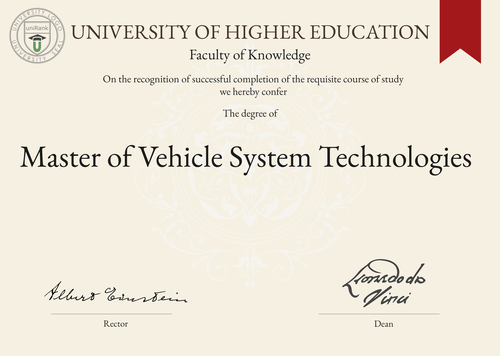
Master of Vehicle System Technologies (M.VST)
Guide to Master of Vehicle System Technologies Program/Course/Degree
Master of Vehicle System Technologies (M.VST)

Program Name:
Master of Vehicle System TechnologiesProgram or Degree abbreviation:
M.VSTDuration range:
Varies by country and university, typically 1-2 yearsTuition range:
Varies by country and university, typically $10,000-$30,000 per yearOverview:
The Master of Vehicle System Technologies program is designed to provide students with advanced knowledge and skills in the field of vehicle systems. This program focuses on the study of various aspects of vehicle technology, including design, manufacturing, operation and maintenance. Students will gain a deep understanding of the latest advancements in vehicle systems and develop the expertise required to tackle complex challenges in the automotive industry.Curriculum Overview by year:
- Year 1: - Introduction to Vehicle Systems - Automotive Engineering Principles - Vehicle Dynamics and Control - Powertrain Systems - Vehicle Electronics and Communication - Year 2: - Advanced Vehicle Design - Vehicle Safety and Crashworthiness - Sustainable Vehicle Technologies - Vehicle Testing and Validation - Research ProjectKey Components:
- In-depth study of vehicle systems and technologies - Hands-on experience with industry-standard tools and equipment - Practical training in vehicle design, manufacturing and testing - Research project to explore a specific area of interestCareer Prospects:
Graduates of the Master of Vehicle System Technologies program can pursue various career opportunities in the automotive industry. Some potential roles include: - Automotive Engineer - Vehicle Systems Analyst - Research and Development Engineer - Vehicle Design Specialist - Manufacturing EngineerSalary Expectations:
Salaries for professionals with a Master of Vehicle System Technologies degree can vary depending on factors such as location, industry and experience. On average, graduates can expect a starting salary of $60,000 to $80,000 per year, with potential for higher earnings as they gain more experience and expertise. For a more accurate understanding of salary expectations, you can utilize the Job Sites Search Engine, from our sister site jobRank, which searches over 4,600 job sites worldwide. Make sure to specify not only the job title but also the country you are interested in.Conclusions:
It is important to note that the duration, tuition fees, curriculum, key components, career prospects and salary expectations of the Master of Vehicle System Technologies program can vary based on the chosen country or location of study, as well as the chosen university. Prospective students are advised to research and compare different programs and universities to find the best fit for their goals and aspirations. Visitors can search for where this specific degree, M.VST, is offered anywhere in the world through the uniRank World Universities Search Engine, which provides comprehensive information on universities and their programs worldwide.World Universities Search Engine
search for Master of Vehicle System Technologies (M.VST) and add the Location (country, state etc.) or specific University you are interested in studying at.
Query examples:
- Master of Vehicle System Technologies (M.VST) United States
- Master of Vehicle System Technologies (M.VST) United Kingdom online
- Master of Vehicle System Technologies (M.VST) Australia international students
- Master of Vehicle System Technologies (M.VST) University of California
- Master of Vehicle System Technologies (M.VST) University of London tuition fees
- Master of Vehicle System Technologies (M.VST) University of Sydney scholarships
Share Program/Course
Interesting? Share this program/course/degree info with your friends now.